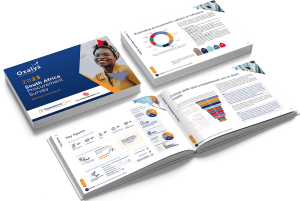Procurement has a key role to play in driving business efficiency in the Fourth Industrial Revolution. To maximise its impact, research points to the fact that investing in the skills of people, especially leadership skills, will be just as important as keeping up with advances in technology. Kumeshnee West, Director: Executive Education at the UCT Graduate School of Business, and a panellist at the recent Smart Procurement World Indaba, unpacks this topic in this month’s SmartProcurement.
In a global environment characterised by volatility, uncertainty, complexity and ambiguity (VUCA), it is more important than ever for businesses to maximise efficiency and respond timeously and flexibly to market demand. Procurement plays a strategic role in this as it drives value, generates savings and potentially increases overall operational efficiency. As a bridge between internal and external stakeholders, procurement has the potential to foster greater collaboration, innovation and better business relationships.
Of course, procurement, in common with all other business functions, is facing disruption, owing to technological advances, including cognitive procurement, blockchain and cloud technology. Technology and automation offer the potential for greater control and efficiency throughout the supply chain, but are intertwined with the threat of job losses and privacy concerns.
The sector faces other pressing issues too. The recent Deloitte Global Chief Procurement Officer Survey gives insight into the challenges and opportunities reported by over 500 respondents from 39 countries. These include the fact that 65% of organisations do not have visibility of suppliers beyond tier one and data analytics are only used by a few companies for supply risk management. Additionally, only a quarter of procurement leaders feel that they are excellent at business partnering and 51% feel that there is a gap in the talent to deliver on the overall procurement strategy.
In fact, talent will be a key enabler of procurement both now and into the future. Contrary to what many may think about the Fourth Industrial Revolution, while keeping up with technological advances is vital, investing in people will be as important, if not more important.
Technology is key, but so are the people who use it
Mastering technological change requires very human skills, such as emotional intelligence and creativity. In fact, Chairman of the World Economic Forum (WEF), Klaus Schwab, believes that talent will become more important than capital.
This is because, ultimately, business is about the connection between people – internally as well as business-to-business. We thus need to make use of technology in a way that is sustainable and helpful – and humane. There is no point in generating more data – we are already overwhelmed with data – it is about how people are trained to use data that will count.
So, what are the skills that we will need to impart to the workforce of the future? The WEF has identified the top ten skills that will be most needed in 2020 as: complex problem solving; critical thinking; creativity; people management; co-ordinating with others; emotional intelligence; judgement and decision making; service orientation; negotiation; and cognitive flexibility. This list certainly resonates with the skills needed in procurement and supply chain management.
Certainly, soft skills that manage the connection between people will be critical when navigating the new digitised world. This is particularly relevant in the procurement function, which involves working collaboratively with suppliers to meet the organisation’s goals – as well as theirs. Building strong, mutually-beneficial relationships will ensure sustainability and survival in an ever-changing environment.
Additionally, there is a growing trend in procurement to allow internal and external stakeholders to access, share and manage data. Strategic sourcing includes aligning plans and business objectives; supplier research, assessment and development; and contract negotiation and risk management. Solid negotiation skills, collaborative abilities and teamwork – within the organisation, across business functions, and with external stakeholders and suppliers – will be key.
Finding innovative solutions, charting new paths and making new connections between many disparate elements will become the norm. This requires an understanding of human behaviour on individual, cultural and societal levels. Businesses need to understand their consumers’ needs as well as the drivers of their behaviour. This takes creative analytical skills beyond merely understanding the numbers.
Businesses are also under increased pressure to involve sustainability practices as part of their operations. Today’s consumers are informed, socially aware and may prefer brands that are engaged with – and are seen to be doing good in – the social and/or environmental spheres. This has an obvious impact on supply chain management and will require businesses to be more consciously ethical, thus business leadership is to take the lead here.
In the Fourth Industrial Revolution, strong, intuitive, empathetic and ethical leadership will be non-negotiable.
Leadership provides the most important opportunity in procurement
Significantly, the Deloitte survey concluded that leadership provides the biggest opportunity in procurement. High-performing organisations are accelerating leadership capability in business, procurement, digital and supplier leadership. They are enhancing executive advocacy and business partnering, and driving change in talent, operational models and digital capabilities as well as greater collaboration and supply chain cost and risk transparency.
Leadership can also rise to the procurement challenge by fostering a culture of innovation. One way to do this is to build diverse teams. Diversity brings different perspectives to the table and ensures that solutions remain relevant to the customer base. This also eliminates blind spots.
And, lastly, leaders in the sector can ensure that they incentivise life-long learning – which is also recommended by the WEF as an orientation towards the Fourth Industrial Revolution. As the nature of work changes, business leaders need to be pro-active in up-skilling and retraining – to future-proof individual careers and to ensure that organisations stay abreast of change.
Obviously, business schools play an integral role here in producing graduates with essential skills, but also in offering opportunities for life-long learning for people to develop new skills at any stage of their career. Educational institutions supply business with critical skills, but it is equally important that industry plays a role in shaping the talent pool and informing educators of trends and changes in the field as well as the skills they want to develop.
Kumeshnee West is the Director: Executive Education at the UCT Graduate School of Business. This article is based on her input in a panel discussion at the 12th Annual Smart Procurement World Indaba.


























